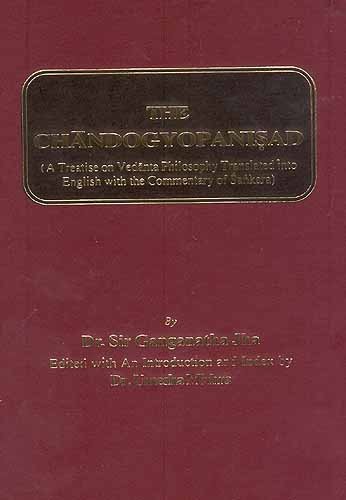Chandogya Upanishad (Shankara Bhashya)
by Ganganatha Jha | 1942 | 149,749 words | ISBN-10: 8170842840 | ISBN-13: 9788170842842
This is the English translation of the Chandogya Upanishad, an ancient philosophical text originally written in Sanksrit and dating to at least the 8th century BCE. Having eight chapters (adhyayas) and many sub-sections (khandas), this text is counted among the largest of it's kind. The Chandogya Upanishad, being connected to the Samaveda, represen...
Section 1.11 (eleventh khaṇḍa) (nine texts)
Upaniṣad text:
Thereupon, the Master of the Sacrifice said to him—“I should like to know you, Revered Sir.”—“I am Uṣasti, the son of Cakra,” he said.—(1)
Commentary (Śaṅkara Bhāṣya):
Thereupon,—after the above,—the Master of the Sacrifice,—the Sacrificer, the King—said—“I should like to know you—who are deserving of all honour,—I desire to know who you are.”—being thus addressed, Uṣasti said—“I am Uṣasti, the son of Cakra,—if you have heard of the name.”—(1)
Upaniṣad text:
He said—“I looked for you, revered Sir, for all these priestly offices; and it was only when I did not find you that I appointed others.”—(2)
Commentary (Śaṅkara Bhāṣya):
The Master of the Sacrifice said—“Truly have I heard of you, revered Sir, as equipped with many qualifications; and I looked for you in connection with all these priestly off ices—the functions of the Priests; and it was only when having looked for you and not found you, that I have appointed these others.—(2)
Upaniṣad text:
“But now you, Sir, take up all the priestly functions.”—“Very well; then, let these same, with my permission, sing the hymns of praise; but as much wealth you give to these, so much you should give to me also.”—“Very well”—said the Master of the Sacrifice—(3)
Commentary (Śaṅkara Bhāṣya):
“Even now, you yourself, Sir, take up all the priestly functions—you may remain here as the Priest.”—Thus addressed, Uṣasti said—“Very well. But these same persons who have been previously appointed by you,—let these, with my permission,—i.e. only permitted by me who am quite satisfied,-—sing the hymns- But you should do this—As much wealth you give as present to these—Prastotṛ and other priests,—so much you should give to me also.”—Being thus requested, the Sacrificer said—“Very well.”—(3)
Upaniṣad text:
Thereupon the Prastotṛ-Priest approached him (and said)—“Sir, you said to me ‘O Prastotṛ, without knowing the Deity connected with the Prastāva, if thou dost chant the Introductory words, thy head shall fall off’;—now, what is that Deity?”—(4)
Commentary (Śaṅkara Bhāṣya):
Thereupon,—having heard Uṣasti’s assertion, —the Prastotṛ approached him—went to Uṣasti, with due respect.—“Before this, you, Sir, said to me ‘O Prastotṛ, the Deity etc. etc.’—Now, what is that Deity—which is connected with the Prastāva (Introduction)?”—(4)
Upaniṣad text:
He said—“Breath.—Verily all these beings merge into Breath itself, and from Breath itself do they
arise. This is the Deity connected with the Prastāva; if, without knowing It, you had sung the Prastāva, your head would have fallen off, if I had said so to you.”—(5)
Commentary (Śaṅkara Bhāṣya):
On being questioned, Uṣasti said—“Breath.” It is only right that Breath should be the Deity of the Prastāva.—“Why?”—Because all beings—animate and inanimate,—merge into Breath, at the time of Dissolution,—and also arise out of Breath at the time of birth, evolution;—i.e. in the form of Breath itself; the prefix: ‘abhi’ indicating in connection with, out of. It is for this reason that this Deity is connected with Prastāva.—If, without knowing this Deity, you had sung the Prastāva,—if you had sung the Introductory Section of the Sāma,—your head would have fallen off,—if I had said to you at that time that ‘thy head shall fall off.’—Thus you have done well, in desisting from the performance when forbidden by me.—(5)
Upaniṣad text:
Then, the Udgatṛ Priest approached him (and said) “You, Sir, told me that if, without knowing the Deity connected with the Udgītha, thou performest the chanting, thy head would fall off;—now, what is that Deity?”—(6)
Commentary (Śaṅkara Bhāṣya):
Similarly, the Udgātṛ Priest asked him—“What is the Deity connected with the Udgītha-Section (of Sāma)?”—(6)
Upaniṣad text:
He said—“The Sun. All these beings sing to the Sun when It stands on high; this is the Deity connected with the Udgītha. If, without knowing this, thou hadst done the singing, thy head would have fallen off,—if I had said so.”—(7)
Commentary (Śaṅkara Bhāṣya):
Being questioned, he said—“The Sun”; all these beings sing—raise their voice to, i.e. sing the praises of—the Sun when it stands on high. This Sun [standing on high is the deity of the Udgītha] because of the syllable ‘ut’ being common to both (‘Udgītha’ and uccaiḥ santam ādityam),—just as [Praṇa is the deity of the Prastāva] because the syllable ‘pra’ is common to both (‘Prāṇa’ and ‘Prastāva’) The rest as before.—(7)
Upaniṣad text:
Thereupon the Pratihārtṛ Priest approached him (and said)—“You Sir, said to me ‘if, Pratihartṛ, thou performest the Pratihāra, without knowing the Deity connected with the Pratihāra, thy head shall fall off’; now, what is that Deity?”—(8)
Commentary (Śaṅkara Bhāṣya):
Similarly, the Pratihārtṛ Priest approached him and asked—“What is that deity which is connected with the Pratihāra?”—(8)
Upaniṣad text:
He said—“Food. All these beings live only when absorbing food. This is the Deity connected with Pratihāra. If, without knowing it, thou hadst performed the Pratihāra, thy head would have fallen off,—if I had said so.”—(9)
Commentary (Śaṅkara Bhāṣya):
Being questioned, he said—“Food. All these beings live only when absorbing—taking to themselves—food. This is the Deity connected with the Pratihāra-Section of the Sāma, on account of the syllable ‘prati’ being common to both (‘pratihāra’ and ‘pratiharamāṇāni’)—The rest as before.—If I had said so.
The three factors of Sāma,—viz., the Prastāva, the Udgītha and Pratihāra,—one should meditate upon these as ‘Breath’, ‘Sun’ and ‘Food’,—such is the upshot of the whole of this section,—The reward for this would consist, either in becoming transformed into Breath (Sun and Food) or the due fulfilment of the Sacrifice.—(9)
End of Section (11) of Discourse I.
